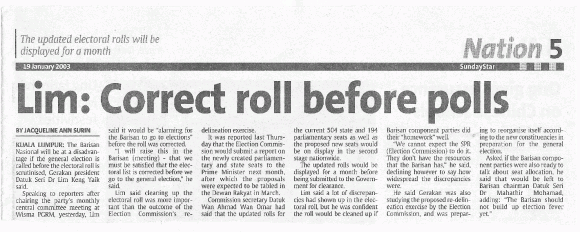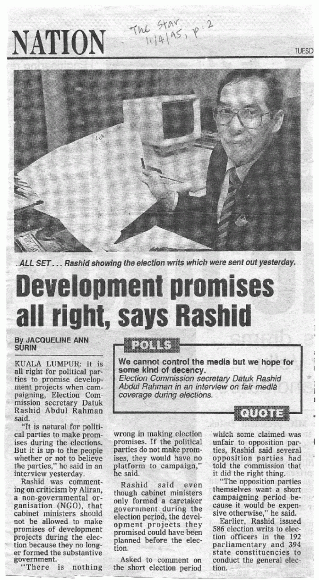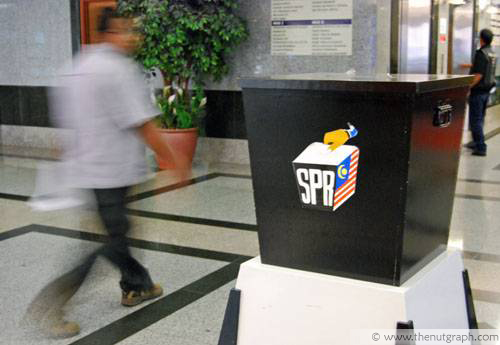FRANKLY, I wasn’t surprised at all when it was reported in late April that both the Election Commission (EC) chairperson and deputy chairperson were Umno members. Even without evidence of party membership and despite the EC deputy chairperson’s subsequent U-turn and denial, it would not be a stretch to imagine both the chairperson and his deputy are Umno members.
I don’t doubt PKR’s announcement about the top EC leaders’ purported political membership was strategically timed to be released a day before the 28 April 2012 Bersih 3.0 protest. Clever strategy aside, Umno membership alone isn’t the only evidence of the EC’s lack of independence. The evidence has been mounting over the years.

What other proof do we have? And how can we be oh-so-certain that the EC is not independent even if it’s eventually demonstrated that neither Tan Sri Abdul Aziz Mohd Yusof nor Datuk Wira Wan Ahmad Wan Omar are members of any political party?
A subservient commission
Firstly, every single member of the EC, including the chairperson and deputy chairperson, is a former civil servant. The most recent appointment, Datuk Christopher Wan Soo Kee, was formerly the Kuala Lumpur Special Branch chief. This composition in itself sets the EC up for bias since civil servants’ professional training is to carry out the wishes of the government of the day.

This point was made by Bersih 2.0 in its recommendations to the Parliamentary Select Committee (PSC) on Electoral Reform in November 2011. It argued that in a country where only one coalition has formed the federal government since 1955, “inevitably, senior civil servants slowly stop making the distinction between the government and the political party”. That includes the Royal Malaysian Police Force as well, which has often demonstrated that BN events can proceed without a hitch while Pakatan Rakyat functions are often prevented from going ahead.
Bersih 2.0’s claim is supported by the testimony of EC officials themselves. In an interview by a team of researchers with the top three EC officials in the 2000s, the then chairperson, deputy chairperson and secretary said it was “normal for them to see the prime minister even before constituency reviews were begun”. The chairperson added that “as a practical matter, requests for meetings by ‘number one and number two’ could not be refused, unlike similar requests from lesser political leaders”. [1]
It is not only academics who have reported on the subservient relationship between the EC and the government of the day. In the course of researching for this column, I found an old news report I wrote in The Star on 19 Jan 2003. The article quotes the then EC secretary as saying that the commission would submit the updated electoral roll to the government for clearance after it had been displayed.

Many citizens have also witnessed first-hand the EC’s subservience to the BN. At a Bersih 2.0 public forum on 21 Feb 2011 in Petaling Jaya, for example, Wan Ahmad’s constant refrain was: “We can propose [reforms] but ultimately, the government decides.”
Competency or complicity?
Then there is the long-standing issue of gerrymandering and unconstitutional malapportionment. Through the years, the EC has redrawn the boundaries of constituencies in ways that have benefited the BN. Is that the mark of an independent commission ensuring free and fair elections?
And there’s been the refusal by the EC to take the BN to task for vote buying through the use of taxpayer’s monies to offer development projects just before the polls. This was most recently notable during the 2011 Sarawak state election. Indeed, it was the EC’s stubborn refusal to even speak up against or investigate the potential violations under the Elections Offences Act in Sarawak that compelled Bersih 2.0 to organise its mammoth rally on 9 July last year.
To be fair to the current EC leadership, chairperson Abdul Aziz is only following in the previous EC leadership’s footsteps. In 1995, then EC secretary Datuk Rashid Abdul Rahman declared there was “nothing wrong in making election promises” during an election campaign:

What does the EC’s apparent ignorance of these election breaches tell us? It tells us that even if the EC leadership are not Umno members, they are either incompetent or complicit with the BN. And it would seem that they have been for at least the past 17 years.
Rescuing the EC
Many academics have, for the past 15 years or more, noted how unfair and problematic our electoral system is. In 1996, notable Australian academic Harold Crouch wrote: “The Malaysian electoral system … [has been] so heavily loaded in favour of the government that it is hard to imagine that [it] … could be defeated in an election.” Ten years later, another academic, J Funston, echoed the same sentiment because nothing had changed. Funston wrote that “EC activities frequently provided direct benefits to the BN”.
How can the EC be rescued? The EC may think that merely choosing a “non-aligned colour” instead of yellow in its logo will do the trick. However, the mountain of evidence that the EC is either incompetent at its best, or not independent at its worst, means much more needs to be done.
In its recommendations to the PSC on Electoral Reform, Bersih 2.0 proposed several measures that would ensure Malaysians had an EC they could have confidence in. One, why can’t we have an EC that comprises more than just retired civil servants? If necessary, the number of commissioners can be increased to ensure wider representation and expertise.
Two, some of the issues we face can actually be addressed by establishing a Code of Conduct, as practised in India, which spells out best practices for all parties and candidates during an election. This code of conduct could also be applied to the media so that newsrooms can be pressured to ensure fair coverage of all candidates and parties no matter their political affiliations.
And three, if the EC is to regain some semblance of credibility, it needs to reclaim its power to make rules under Article 113(5) of the Federal Constitution. These rules can be used to prohibit the use of public institutions or government machinery in election campaigns.
The question, of course, is whether the EC wants to be rescued. If the growing evidence of more than a decade is anything to go by, I doubt it. And if the EC won’t reform itself of its own volition, what else are citizens left to do? ![]()

[1]
Lim, HH (2005) “Making the system work: the Election Commission”, in Putucheary, M and Othman, N. (ed.), Elections and Democracy in Malaysia, Universiti Kebangsaan Malaysia, Bangi, p.263.
Jacqueline Ann Surin believes the EC should not be so worried that with electoral reforms, BN will lose power. The commission should be more worried that without electoral reforms, BN will come into power only to have its legitimacy questioned.
[related-posts]


seniorsinner HA HA HA says
JA
When I was younger, the conversation between my dad and his friends were about politics – global and local; it was in the mid-70s.
They always said it was the fault of the people whenever there were discrepancies in governance.
After 50 odd years, it is the same old story, but these days there is hope of renewing age-old practices.
IT IS IN THE HANDS OF [VOTERS]. THE BATTLE HAS TO BE TAKEN TO THEM. VOTERS. EDUCATE THE RURAL FOLKS. EVERY NOOK AND CORNER OF THIS LAND.
Make a stand…tell the people that all wrongdoings will be dealt with when PR takes office.
FreeAsian says
Thanks. Good write up. As for proof of gerrymandering, one can probably do scientific/statistical analyses of the constituent demarcations and show that the changes that occurred, in terms of voting numbers and constituent sizes, were unlikely to have happened by chance.
Even by looking at the graph of constituent sizes by political parties, it is obvious that it is by design that most BN-won seats have proportionally the least number of voters.
terence says
I heard the EC even attends UMNO rallies. What’s a supposedly independent body doing attending a rally? What are government or government-linked companies doing attending such a rally?
Ellese says
The allegation that they were Umno members is false. It so happened they have similar names. Why are we propagating lies and falsehood to justify the ends?
JW Tan says
What about the assertion that the other EC leaders are ex-civil servants?
The point is not that some EC leaders are purportedly members of political parties. The point is that the EC’s credibility is so poor that people do not trust it. The EC is not effective. Time to rebuild it entirely. Unless you believe that the EC does not need to be effective, in which case you do not believe in democracy or civil rights for Malaysians.
phang says
This goes beyond political party membership. This is about an EC that is supposed to be completely impartial working the books to ensure UMNO wins every election because they think it is “part of their job” to follow “orders” from UMNO. It’s like joining a competition and the judge and jury are employees of one of the contestants specially hired to let this one contestant win. How is that fair?
stewoolf says
Bottom line: has BN done enough to garner enough anti-BN votes to overcome one-sided institutions, such as EC, police, etc., etc. for PR to take Putrajaya, or be close to? Only a strong opposition, whether PR or BN, that has a decent chance of taking Putrajaya at future elections, would encourage personnel independence as they hedge their bets on the opposition. Proposed pro-opposition measures that are grounded on fairness would stand better chances of survival then.
Adam says
I just want my urban vote to be reasonably equal to those from the rural areas. How can we call ours a democratic country when the very basic principle of one person one vote has been so indecently and blatantly compromised? Shame on the EC not to correct this discrepancy. Or, is it done on purpose?
chew km says
There is lack of balance of power as practiced in a democracy. Without this check and balance, the EC has been manipulated to reward the dirty and corrupt Umno.
Umno Baru was declared illegal and see what happened to the judge who made the right decision which is also the legal one? Not only was the guilty rewarded with a “legal” title, it was also rewarded the millions of ringgit belonging to the “real legal” party.
So who needs Bersih ? Dirty tricks are needed for Umno to win. An independent EC is bad for umno. The rakyat has no need for a fair election. You just wait, Najib’s image building team dan rakan-rakan are coming up with more handouts […] and other goodies.
Gopal Raj Kumar says
Why is membership of a political party, a fundamental democratic right of everyone in a democracy, evidence of partiality on the part of the electoral commission? What puerile immature logic is that in the shape of a pocket? And you allege the absence of fairness and impartiality on the part of the Election Commission?
The comments of the writer of this colomn are perhaps the reason there is so much misunderstanding and confusion about what constitutes right and wrong within the opposition in Malaysia. And I don’t simply refer to the organized Opposition parties within and outside Parliament.
Assumptions and allegations without a scintilla of evidence capable of proof. The fact that most of Singapore’s government is Chinese does not necessarily make Singapore a racist state (although I could argue otherwise from the evidence of their leaders’ pronouncements).
The shape of that pocket is determined by its contents. So far it is ugly and out of shape.
Vin says
I don’t think the article means to say that the EC is perceived to be biased because some of it’s members were civil servants. I think the loophole that the article is highlighting is that our current EC is made up primarily of former civil servants. Meaning to say, the EC does not represent all Malaysians. Since the EC was commissioned to serve all Malaysians, I think it makes sense to include other Malaysians who were not civil servants and have different expertise.
Revising and reforming our electoral system is not racist or anti-government. If our doubts regarding the electoral system are appeased, we wouldn’t make a hum even if most seats or every seat in our Parliament went to the government. Singapore is an unfair comparison to make in this instance because the fairness of their electoral system is not being questioned. Although most of Singapore’s government is Chinese, the seats were won under clean and transparent elections which is precisely what we are fighting for.
My point is, it is not unfair that retired government servants are members of EC. It is unfair when almost the whole of our EC is made up of them.
Gopal Raj Kumar says
Dear Vin,
“I think the loophole that the article is highlighting is that our current EC is made up primarily of former civil servants. Meaning to say, the EC does not represent all Malaysians. Since the EC was commissioned to serve all Malaysians, I think it makes sense to include other Malaysians who were not civil servants and have different expertise.”
Your statement quoted above makes no sense. How does the existence of former civil servants in the EC create a loophole in the EC. And if there is a loophole what loophole do you refer to? Secondly why is it a “loophole” as you call it because former civil servants are to be found in the EC? Where in the constitution does it say no former civil servants may serve in the EC?
How does the EC not represent all Malaysians? In what respect are they meant to represent all Malaysians? Such a situation as you ask for is an impossibility.
Those who are or profess to be anti-government are not anti-government for the same reasons. Those who profess to be for government do not necessarily support government for the same reasons either. So how could such a statement as the one you make in support of this article be logical?
And finally what other expertise do you suggest members of the EC possess that they do not at present possess? And please provide us with some examples of what you mean.